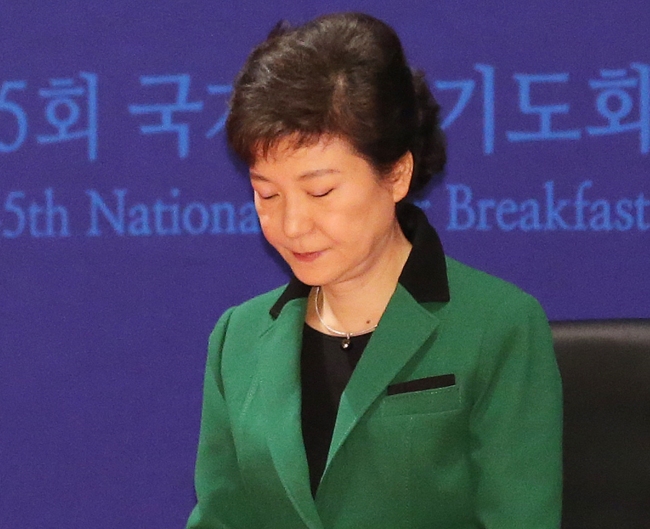 |
박근혜 대통령이 7일 서울 강남구 삼성동 코엑스에서 열린 제45회 국가조찬기도회에서 개회기도를 하고 있다.(연합뉴스) |
<관련 영문 기사>
DUP blasts Saenuri plan for Assembly vote on reform bill
By Lee Joo-hee
The war of nerves between the rival parties over President Park Geun-hye’s government reorganization plan persisted Thursday as the opposition Democratic United Party shot down the Saenuri Party’s suggestion to put the bill up for a vote.
As concerns and criticism surged over the drawn-out void in state affairs, Saenuri Party floor leader Lee Hahn-koo proposed having the National Assembly speaker put the contentious bill to a vote “fair and square.”
“Let’s give each lawmaker a chance to cast their vote on what has so far been agreed on in the negotiation. Although the issues related to the Korea Communications Commission have not been fully resolved, let’s make a revision bill focused on other parts that we have so far reached an agreement on,” Lee said at a party meeting.
DUP immediately shut down the suggestion.
“Having the bill put to a vote by (the Assembly speaker) cannot be done without the consensus of the rival parties,” DUP floor leader Park Ki-choon said, adding “I hope it is not some sort of manipulative tactic by the Saenuri Party that has the majority of seats such as to eventually have both the original and revised bills put up to a vote.”
“I, however, do agree to creating a revised version (of the bill) to approve what has already been agreed on except for the issue relating to the KCC.”
Based on the National Assembly Act revised last May, the Assembly speaker’s right to put a bill to a vote has been weakened, now requiring a consensus of the representatives of the negotiating parties.
The leadership of both parties have been slammed for the lagging negotiations as the two sides remain at loggerheads over the last remaining issue of the transferring of some functions of the KCC to the Ministry of Future Planning and Science. President Park’s proposal would see the authority to oversee regulations related to cable network service operators move to the ministry.
The standoff had continued earlier despite the DUP’s compromise offer on Wednesday, which included proposals to raise the bar for prospective executives at public broadcasters, hold a parliamentary hearing on the controversial managements at those companies, and to make joint calls for the investigation and resignation of Kim Jae-chul, the pro-government president of MBC TV.
The Saenuri Party rejected the demands saying they trampled upon the principles of the law, and instead suggested finding alternatives to guarantee the broadcasting companies’ neutrality such as by setting up a special committee if necessary.
The next extraordinary session is set to open Thursday.
President Park, for her part, continued to push for a compromise by the opposition, stating in her speech at a gathering of church leaders early Thursday, “All of the political leaders in our country must reflect upon themselves on what their true duties are.”
“The situation home and abroad is more difficult than ever right now. The public economy is ailing in the midst of a global economic crisis, while the security situation is grave following North Korea’s nuclear test and provocation,” Park said.
“It would be greatly appreciated if politics would trust the president and give a chance to serve the people.”
Park’s government continued to remain in doldrums as she put off the final confirmations for the ministers that have completed the hearing process citing other unfinished business, namely the government reform plan.
The presidential office is also still in disarray with the lineup of presidential secretaries still incomplete.
Controversy has followed some of the questionable changes in designations. For instance, a former candidate to become the secretary on health and welfare was reportedly downgraded to a senior executive administrator without an explanation. Another candidate to become the secretary on public relations has been missing in action reportedly over dissatisfaction with his position, and another candidate is being considered as a replacement.
Cheong Wa Dae has so far refused to officially confirm the appointments of secretaries saying it did not deem the positions to require formal announcement.
For now the state administration vacuum continues in the face of an escalating security threat by North Korea, which again threatened a “nuclear war” on Thursday through its Rodong Shinmum, the official newspaper of its ruling party.
Cheong Wa Dae has explained that due to the crisis situation, it was informally operating the National Security Council, which is designed to be headed by the president and run by the chief of the Presidential Office of National Security Kim Jang-soo. Kim’s appointment remains in the air as his position was newly created in the incoming government plan pending at the Assembly.
The NSC is joined by the prime minister, National Intelligence Service director and ministers of foreign affairs, unification and defense. None of the ministers-designate have been confirmed to their post while defense minister-nominee Kim Byung-kwan, in particular, awaits a tough confirmation hearing on Friday due to allegations of ethical misdeeds in the past.
Cheong Wa Dae, meanwhile, decided to execute projects for which the budget had already been secured regardless of the fate of the government organization bill.
(jhl@heraldcorp.com)




![[Exclusive] Hyundai Mobis eyes closer ties with BYD](http://res.heraldm.com/phpwas/restmb_idxmake.php?idx=644&simg=/content/image/2024/11/25/20241125050044_0.jpg)
![[Herald Review] 'Gangnam B-Side' combines social realism with masterful suspense, performance](http://res.heraldm.com/phpwas/restmb_idxmake.php?idx=644&simg=/content/image/2024/11/25/20241125050072_0.jpg)

